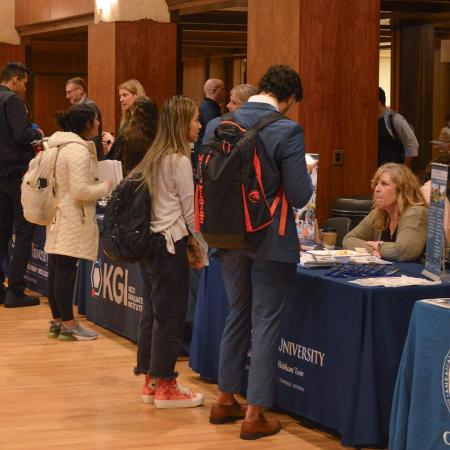The College of Science is pleased to announce “The Future of Science – Thought Leadership Forum” on Monday, March 7, from 8:30 a.m. to 7 p.m., in the Horizon Room (hybrid format).
This forum provides an exciting opportunity for the College of Science community to engage together in vigorous analysis and deliberative dialogue as we contemplate our future. The gathering is a part of the College’s strategic planning process as, in a community-wide effort, we develop a plan for the next five years.
The event is open to all members in the College, and attendees are welcome to join all or some of the sessions. Register now.
“The purpose of this forum is to engage faculty, staff and students in envisioning a bold future for the College,” said Roy Haggerty, dean of the College of Science. "As a community, we will deliberate, identify opportunities, cast a vision for the future, and plan concrete actions to realize our shared goals. I look forward to stimulating dialogue and insights shared by speakers who have led science at the highest levels.”
The College of Science launched its strategic planning process in Fall 2021. Chaired by Associate Dean Vrushali Bokil, the Strategic Planning Committee, composed of faculty, staff and students from across the college, is conducting community engagement, visioning and assessment to develop the next strategic plan.
The forum’s keynote speakers will share their visions for the future of science and will challenge the College of Science to engage in this new future. Moderated breakout sessions, led by strategic planning committee members, will provide an opportunity for dialogue among smaller groups of faculty, staff and students to discuss priorities and emerging ideas. Strategic Planning Committee facilitators will record key ideas presented and the range of dialogue heard across the course of the day. This input will help inform the development of the strategic plan.
Invited guest speakers
Kelvin Droegemeier, Regents Professor of Meteorology, Weather news Chair Emeritus, and Teigen Presidential Professor at the University of Oklahoma
Laura Greene, Chief Scientist, National High Magnetic Field Laboratory (Florida State University, University of Florida, and Los Alamos National Laboratory), Marie Krafft Professor of Physics at Florida State University.
Rosalyn (Roz) Hobson Hargraves, Division Director of the Division of Undergraduate Education at the National Science Foundation and Professor of Electrical and Computer Engineering at Virginia Commonwealth University.
Holden Thorp, Editor-in-Chief, Science Family of Journals.
Agenda
Morning session
8:00 a.m. – Breakfast
8:30 a.m. – Dean Haggerty introductions of speakers and provost
8:45 a.m. – Provost Edward Feser welcome
9:00 a.m. – Laura Greene
9:30 a.m. – Q&A with Laura Greene
9:45 a.m. – Break and mingle
10:00 a.m. – Breakout sessions for COS community
11:00 a.m. – Rosalyn Hargraves (virtual)
11:30 a.m. – Q&A with Rosalyn Hargraves
11:45 a.m. – Break and mingle
Lunch: Noon - 1:30 p.m.
Afternoon session
1:30 p.m. – Holden Thorp (virtual)
2:00 p.m. – Kelvin Droegemeier (virtual)
2:30 p.m. – Break and mingle
2:45 p.m. – Open Q&A
3:15 p.m. – Break and mingle
3:30 p.m. – Breakout Sessions for COS community
4:30 p.m. – Strategic planning report out from both sessions
5:00 p.m. – Happy Hour
Evening session for students
6:00 p.m. – Breakout Session for COS students
7:00 p.m. – Event ends
Keynote speakers
Laura Greene is Chief Scientist at the National High Magnetic Field Laboratory (Florida State University, University of Florida and Los Alamos National Laboratory) and the Marie Krafft Professor of Physics at Florida State University. Greene is an expert in quantum mechanics known for her discoveries and research in unconventional superconducting materials and high magnetic fields. She also is a leading advocate for diversity in science and a champion for women in scientific and engineering fields. Greene is a member of the U.S. National Academy of Sciences and of the President’s Council of Advisors on Science & Technology (PCAST).







